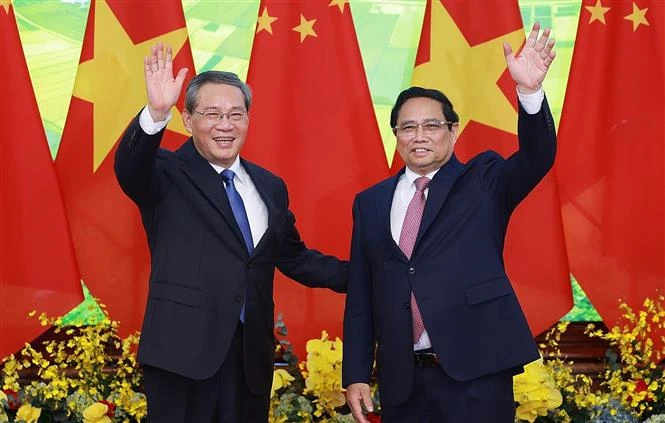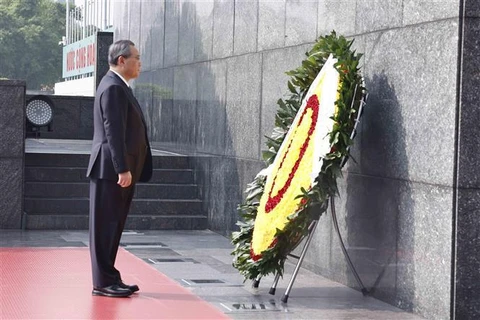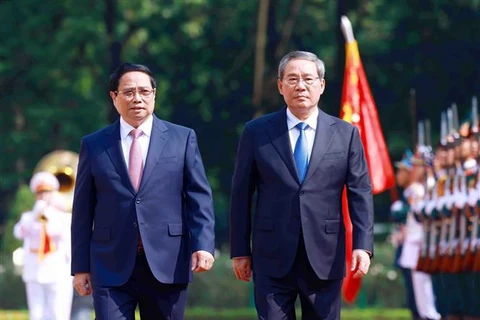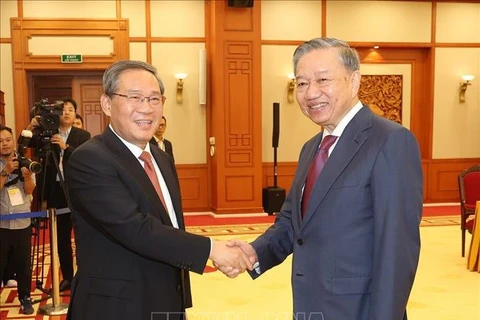
Hanoi (VNA) – Vietnamese Prime Minister Pham Minh Chinh held talks with Chinese Premier Li Qiang after hosting an official welcome ceremony for the latter in Hanoi on October 13 morning.
Chinh welcomed Li’s official visit to Vietnam, which is also the first by a Chinese Premier over the past 11 years. He expressed his belief that the visit would be a success, spreading the positive impact to ministries, agencies, sectors and localities of the two countries about both sides’ determination in realising the high-level perceptions and developing the bilateral relationship in a more effective, practical and comprehensive manner, thus contributing to peace, stability, cooperation and development in the region and the world as well.
In an atmosphere of sincerity, friendship, and openness, the two leaders informed each other about the situation of each Party and each country. They deeply evaluated the implementation of common perceptions and cooperation agreements in many fields between the two countries and agreed on directions and measures to contribute to the effective implementation of the direction of "six major goals" and the building of a Vietnam-China community with a shared future that carries strategic significance reached by the top leaders of the two Parties and countries during high-level visits, and most recently the state visit to China by General Secretary of the Communist Party of Vietnam Central Committee and State President To Lam in August 2024.

Congratulating the Chinese Party, Government and fraternal people on their achievements over the past 75 years, PM Chinh affirmed that Vietnam always attaches importance to strengthening and developing its friendly and cooperative relations with China, considering it a consistent policy, an objective requirement, a strategic choice, and a top priority in Vietnam's foreign policy.
Li expressed his delight at paying the first official visit to Vietnam in his position as the Premier, stressing that China highly evaluates its relationship with Vietnam and always considers Vietnam a priority in its neighbourhood diplomacy policy.
Both leaders noted with pleasure the significant and encouraging achievements in the bilateral friendship and cooperation, with strengthened political trust, frequent exchanges and meetings at various levels, and accelerated strategic connectivity, particularly in transport connectivity. Practical cooperation across multiple sectors has achieved concrete results, with two-way trade increasing by 21.9% in the first nine months of 2024. Tourism cooperation has also shown a robust recovery, with Chinese tourist arrivals to Vietnam reaching 2.7 million in the same period, surpassing the total number for the whole 2023. Locality-to-locality collaboration has been vibrant while multilateral coordination has become closer and more effective.
Regarding the bilateral cooperation in the coming time, they agreed to effectively realise the common perceptions reached by the top leaders of the two Parties and nations; continue consolidating political trust and maintaining regular meetings and exchanges at all levels. They committed to enhancing mechanisms for exchanges and cooperation, particularly in diplomacy, national defence and public security; promoting practical cooperation in key areas, increasing people-to-people exchanges, and reinforcing the solid social foundation for the development of the Vietnam-China relations.
The two leaders pledged to maintain close collaboration and mutual support within multilateral mechanisms and forums; and cooperate effectively in land border management. At the talks, the two prime ministers formally announced the official operation of the Ban Gioc (Vietnam) – Detian (China) waterfall scenic area from October 15, 2024.
The Vietnamese PM suggested expediting the necessary procedures to open a Vietnamese Consulate General in Chongqing as soon as possible, further advancing trade cooperation and expanding market access for high-quality Vietnamese agricultural products, including citrus fruits, pomelo, avocado, custard apple, water apple, traditional herbal medicines of plant origin, buffalo meat, beef, pork, livestock and poultry products, and farm-raised ornate spiny lobster. He also requested support for establishing a Vietnamese Trade Promotion Office in Haikou this year, and more offices in Chengdu (Sichuan) and Nanjing (Jiangsu) in the near future.
He called for improved customs clearance efficiency at border gates, advancing “soft connectivity” through smart customs, and launching new models for cross-border economic cooperation between Vietnam and China.
Regarding transport connectivity, Chinh called for collaboration to effectively materialise signed railway cooperation documents in order to develop a modern railway industry through preferential loans, technology transfer, and personnel training for Vietnam in service of the implementation three standard-gauge railway lines connecting northern Vietnamese localities with China, namely Lao Cai – Hanoi – Hai Phong, Lang Son – Hanoi, and Mong Cai – Ha Long – Hai Phong.
For investment cooperation, he proposed joint efforts to put in place large-scale, high-tech projects in the sectors where China has strength and Vietnam has demand, which are seen as symbols of the bilateral ties. They cover such areas as renewable energy, supporting industries, electric vehicles, international financial centres, free trade zones, smart cities, digital economy, green economy, and circular economy.
The Vietnamese PM also highlighted the need to enhance cooperation in banking, science and technology, education, culture, tourism, and environmental protection. He suggested the two sides step up the sharing of data on meteorology, hydrology, and cross-border water resources, while working together to ensure sustainable management and use of the Mekong-Lancang River water resources.
Additionally, he called for the effective implementation of scholarships for Vietnamese students, support for the establishment of a Vietnamese cultural centre in Beijing, and cooperation in building a master plan for the Year for Vietnam-China Humanistic Exchange 2025.
The two countries should strengthen tourism cooperation, and create conditions for Vietnamese airports to extend flight schedules at Chinese airports, Chinh suggested.
Li expressed his support for PM Chinh's proposals, affirming China's readiness to work with Vietnam to foster the political foundation and practical cooperation.
He pledged that China will further open its doors for Vietnamese goods, particularly agricultural and aquatic products, and high-quality fruits, and coordinate to facilitate quarantine and customs procedures, stressing China stands ready to resolve trade policy issues to ensure sustainable and growing bilateral trade.
The Premier suggested the two nations enhance strategic connectivity, especially in transport infrastructure; promote cooperation in economy, trade, and investment, especially in manufacturing, processing, agriculture, supply and production chain maintenance, and vocational training; and expand finance-monetary collaboration, making the bilateral cooperation more effective and practical.
The Chinese leader said the two sides should work to ensure the success of the Year for Vietnam-China Humanistic Exchange 2025, and strengthen the social foundation, and expressed his support for stronger tourism cooperation, locality-to-locality exchange, and opening more two-way flights.
The two sides exchanged sincere and straightforward views on maritime issues, and agreed to continue strictly implement the high-level common perceptions and the agreement on basic principles guiding the resolution of maritime issues between Vietnam and China, appropriately managing differences, and actively seeking mutually-acceptable, fundamental, and long-term solutions in line with the agreement on basic principles guiding the resolution of maritime issues and international law, including the 1982 United Nations Convention on the Law of the Sea (UNCLOS). They agreed to avoid actions that could complicate the situation and to maintain stability at sea together, while effectively implementing negotiation mechanisms on maritime issues, and actively promoting cooperation in less sensitive areas as well as search and rescue operations at sea.
Chinh called on both sides to respect each other’s legitimate rights and interests, resolve disputes and disagreements through peaceful means in accordance with international law, particularly the UNCLOS 1982; properly address issues related to fishermen and fishing vessels in a manner that aligns with the friendly relations between the two countries, ensuring that the East Sea issue does not impact the bilateral political trust and damage the sentiments and confidence of the two countries' people.
At the end of the talks, the two leaders witnessed the exchange of 10 cooperation documents in the sectors of transport connectivity, customs, public welfare, education, agricultural product trade, media, and banking.

The documents included a memorandum of understanding (MoU) between Vietnam’s Ministry of Transport and China’s National Development and Reform Commission on technical plans for rail connectivity between Vietnam’s Lao Cai station and China’s Hekou North station; the working minutes between Vietnam’s Ministry of Transport and the China International Development Cooperation Agency (CIDCA) on a feasibility study for a project to build the planning schemes for the Dong Dang - Hanoi and Mong Cai - Ha Long - Hai Phong standard-gauge railway routes; a MoU between Vietnam’s Ministry of Planning and Investment and CIDCA on jointly promoting repairs and maintenance of the Vietnam-China friendship palace; and another MoU on strengthening human resource development cooperation under the Global Development Initiative.
The other MoUs also included those between Vietnam’s Ministry of Industry and Trade, and China’s Ministry of Commerce on enhancing cooperation in building sustainable agricultural supply chains, and on establishing a working group to study a model for the development of cross-border economic cooperation zones between Vietnam and China; an action plan between the two countries' customs agencies, focusing on mutual recognition of Vietnam's priority enterprise programme and China’s Authorized Economic Operator programme.
The two leaders also witnessed the exchange of other MoUs covering cooperation between the Vietnam News Agency (VNA) and the China Central Television (CCTV) and between the Vietnam National University, Hanoi, and Peking University, and an MoU between the National Payment Corporation of Vietnam (NAPAS) and UnionPay International regarding the implementation of QR code-based cross-border payment services between Vietnam and China./.






















